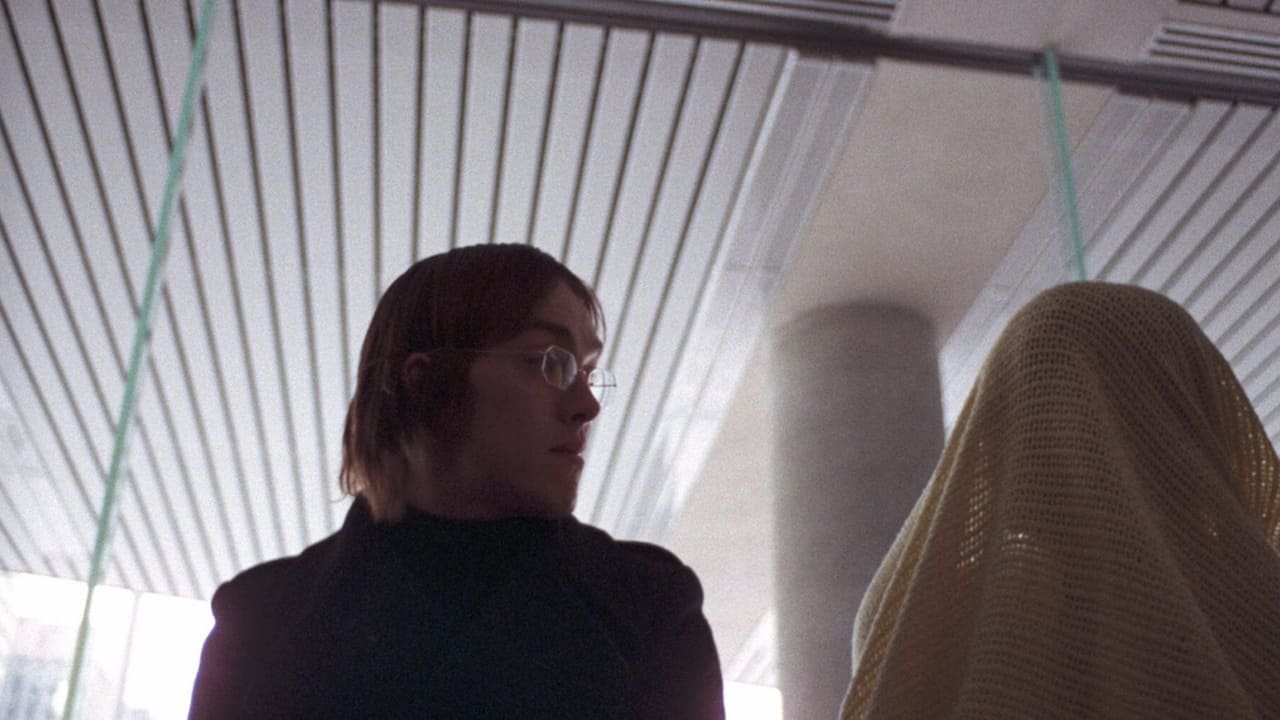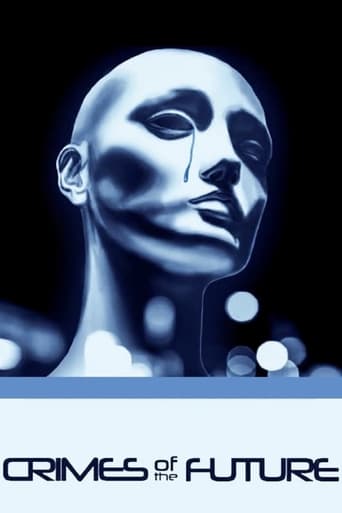

In a future imperfect all females have perished due to a deadly chemical outbreak, leaving the male population to fend for themselves. Among them Aaron Tripod (Ronald Mlodzik), a researcher coping in the new world now devoid of a moral compass. During his studies he encounters a patient, which emits mysterious excretions tasting of chocolate. Once the subject inexplicably disappears Aaron employs himself in another clinic, which serves as a compound for individuals with similar bodily substances. There he encounters the changing functions of the new man and its new flesh. All with true Cronenberg-esque style...Similar in execution as "Stereo", with an upgrade from black and white into full colour, but still experimentally coping without sound, instead inputing odd disjointed sounds and a voice-over to convey the slightly misogynistic story. Rife with motifs featuring in Cronenberg's earlier works, like "Shivers", "The Brood" or "Scanners", this artsy feature remains an intriguing expansion of Cronenberg's cinematographic world-view. Despite a larger budget than "Stereo" and undeniably better technical resolution with some excellent framing of shots, "Crimes of the Future" is comparatively a step further into detrimental watching, making novelties like fast forward necessary to survive the viewing.Nonetheless the overall experience remains an excruciating watch as a product of a student filmmaker, overawed by his own brilliance, but unaware that his supposedly nouvelle experiment in filmmaking is mostly unwatchable drivel. As such the style is almost unbearably self-defeating, making the story drown under the pretentious exposition and ultimate lack of direction. The script may sound cerebral (however truthfully strongly undercut by an intellectual overreach), but that does not excuse a total detachment from the viewing audience. Ultimately Cronenberg's venture feels overly childish in his introvert drive for novelty. Several scenes do manage to build a vague anxiety with it cold and distant atmosphere, especially the layered denouement involving a bout of paedophilia.Best viewed for Cronenberg fanatics with a strong inclination towards understanding his perspective on film and exploring his growth as a filmmaker. Remaining subjects best resolve to focusing on his later works.
... View More"Their thoughts are opaque to me," coldly notes the androgynous observer Adrian Tripod (Ron Mlodzik, who would make Michael Jackson look manly by comparison) at "The House of Skin." The patients, it seems, have started secreting some kind of foam from various orifices. Before long, the hemorrhaging is commonplace. Tripod licks the secretions from one man's face as he lies dying. One colleague, "once a fierce sensualist," contracts a venereal disease that causes his body to produce new organs. The disease is deemed a "creative cancer" and the extraneous organs harvested (though they continue to develop). Another sprouts a "cerebral antenna" from his nose. Like STEREO, CRIMES OF THE FUTURE is an insular, silent movie with voice-over narration that is delivered in a carefully measured, clinical monotone. There are some grating sound fx in CRIMES OF THE FUTURE that almost suggest we're looking into a fishbowl (and call to mind the "industrial symphony" sounds in David Lynch's ERASERHEAD). This is an experimental masterpiece. As the narrator puts it: "We are now all disciples of a new master, it seems."
... View MoreCrimes of the Future starts out stronger, more dynamic than its predecessor, "Stereo" and indeed throughout the film there is more of an emphasis on "action" though it is a weird, distanced, poorly choreographed sort of action that could almost be at home in "Dr. Who"; but on the whole the film is very similar to "Stereo" both thematically and cinematically, apart from the major obvious difference of color film. Like the previous film it was shot silent and makes use of voice-overs, and like "Stereo" it is an SF film about a fictional scientific institute, in this case dedicated to finding the cause of a worldwide plague that has killed off the majority of women. Like the previous film it stars Ronald Mlodzik, who seems to perfectly convey a 60s Mod vision of an otherworldly character, in this case (apparently) a journalist -- or perhaps a physician/scientist, Adrian Tripod, doing a story -- or studying patients at an institute -- somewhere -- afflicted with this strange disease/plague/virus but not yet dead. Like the earlier film it has an unseen (apparently dead in this case) mastermind scientist character, called Antoine Rouge, who may in fact be responsible for the plague and who may also be reborn in another body. This was an extraordinarily dense and difficult work which I can only scratch the surface of on one viewing; I don't know how much I liked it, but I was awfully impressed at the intellect behind it; like Cronenberg's first feature, it bears comparison with the early works of Peter Greenaway.
... View MoreLike Apocalypse Now, The Shining, (Fassbinder's) Satan's Brew, and others, this movie makes you feel like you're watching the state of insanity as rebellion. The protagonist in Crimes of the Future, Adrian Tripod is free from all judgment. It is exhilarating and hilarious to watch him respond to his environment. Cronenberg's writing of the voice-over narration is frightfully intelligent and ahead of its time. I believe this short film will gain popularity exponentially in the next ten years with its inclusion on the Fast Company DVD. Ronald Mlodzik's performance is overwhelmingly detailed and his delivery of the narration (if it is him) has more confidence, if not arrogance than anything I've experienced in cinema. Perhaps Alexandra Stewart in Chris Marker's San Soleil can rival, or Malcolm McDowell in A Clockwork Orange. You must see this!!!
... View More